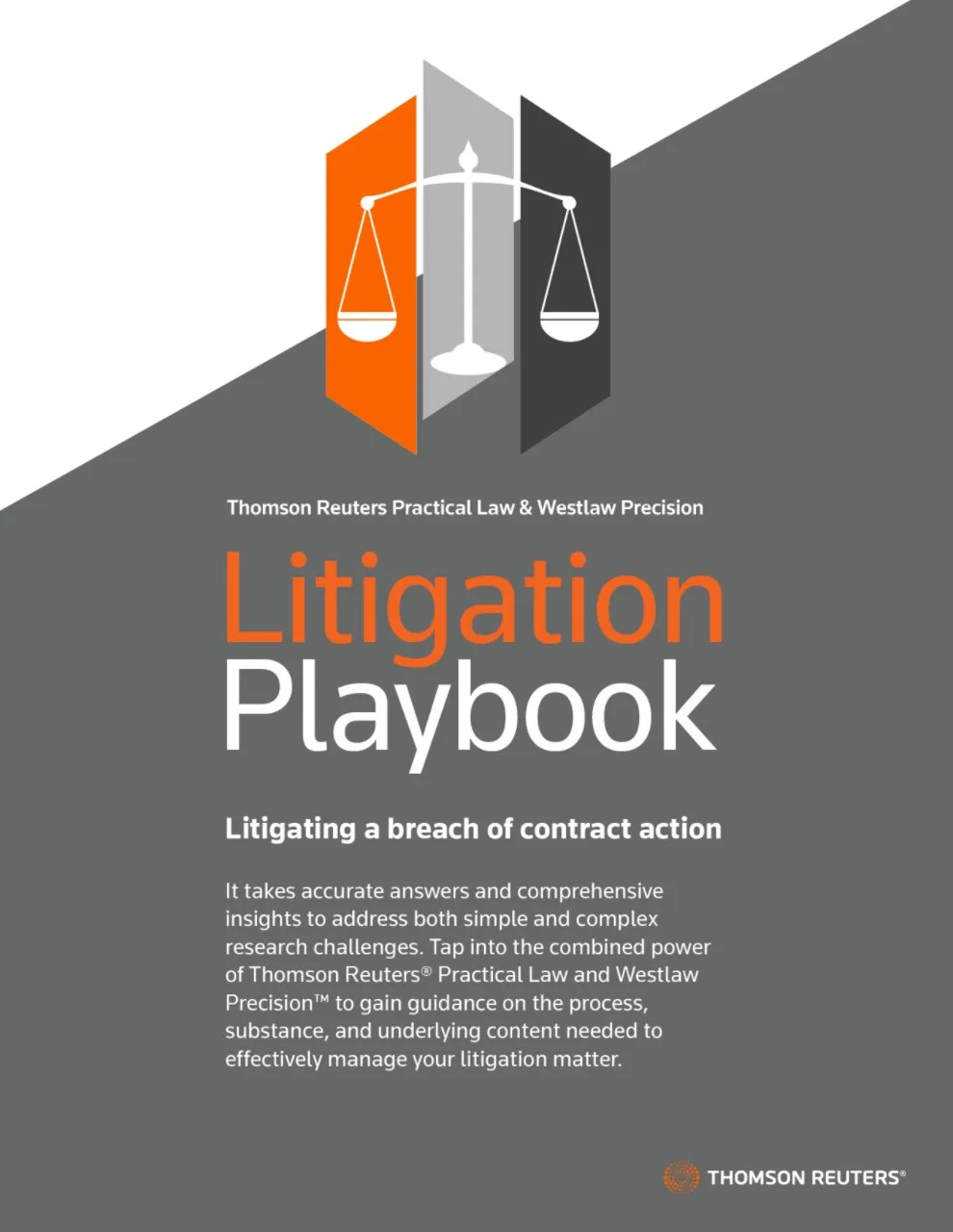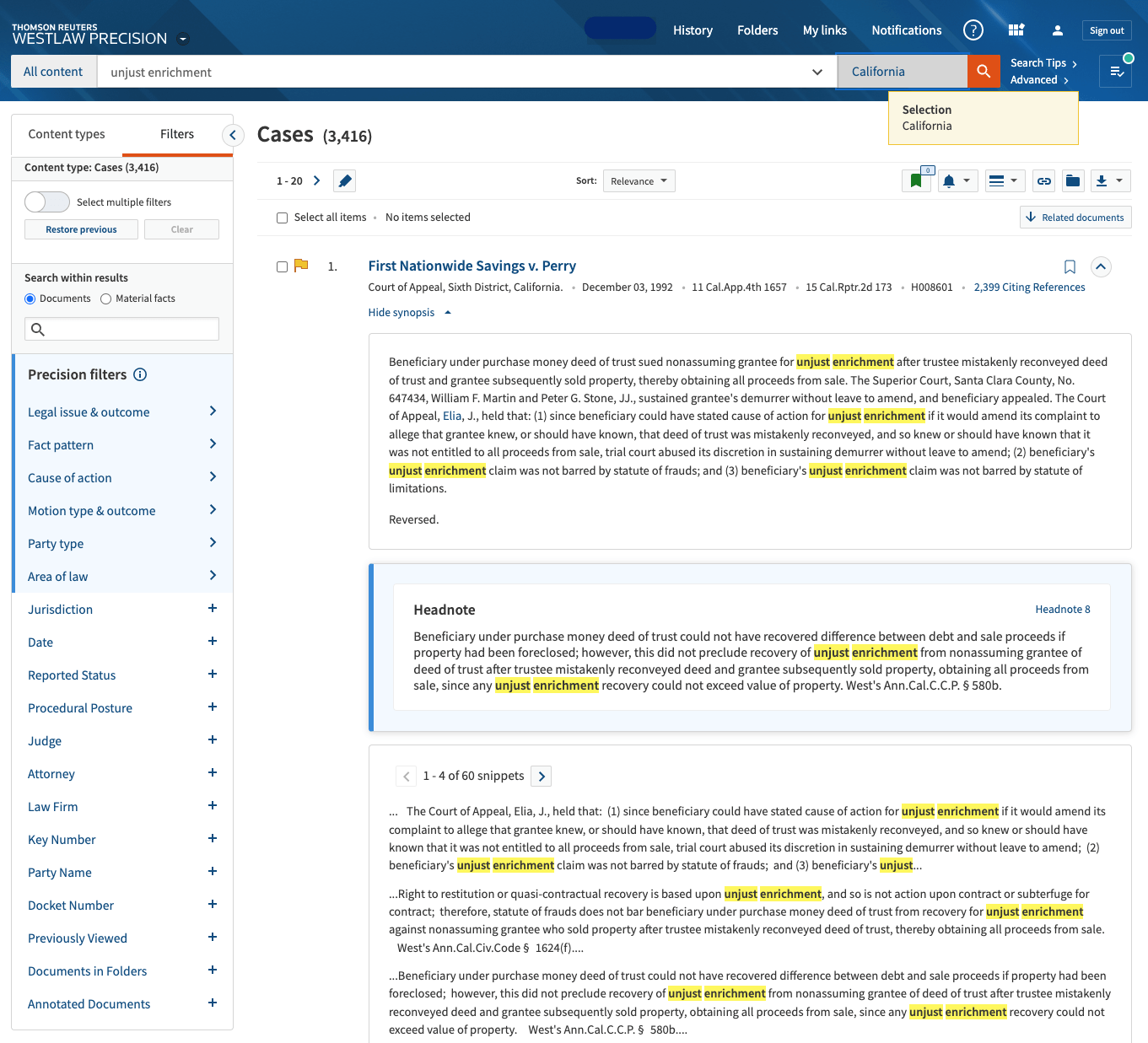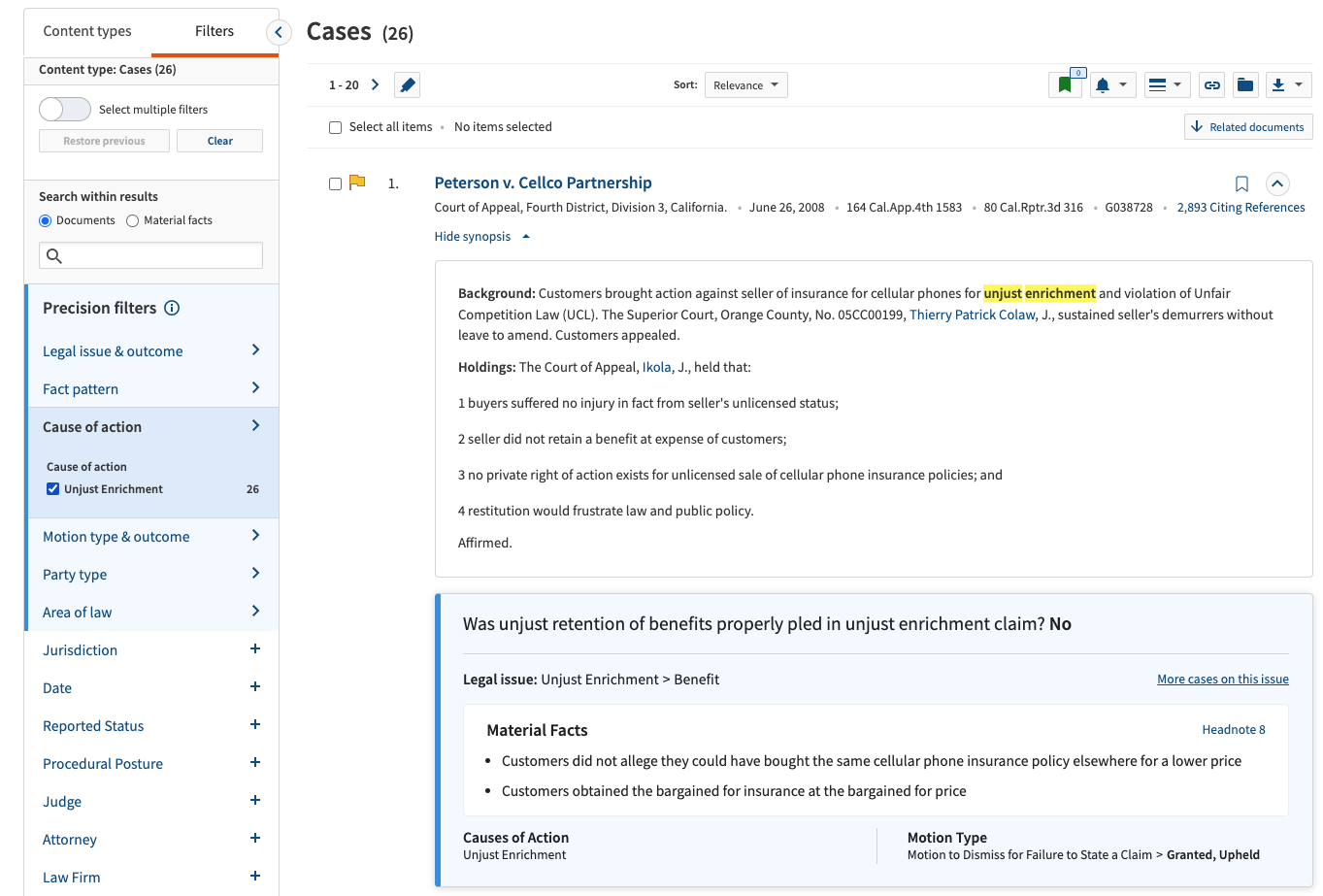Individuals can file a civil lawsuit if the opposing party for whatever reason refuses to make amends. However, it may be challenging to establish unjust enrichment in court due to particular situations and considerations. In many states—including California, the concepts are not as obvious as they may seem because each instance has unique data.
The following overview of unjust enrichment offers a definition and analysis with case examples demonstrating the nuances of this cause of action.
Jump to ↓
What is a cause of action for unjust enrichment?
Does California recognize unjust enrichment?
Case example where unjust enrichment claim was unrecognized
Case example where unjust enrichment claim was partially recognized

CoCounsel Legal
AI lawyers swear by: Trusted content, expert insights, and an all-in-one solution with ISO/IEC 42001:2023 certification
See it in action ↗What is a cause of action for unjust enrichment?
A cause of action for unjust enrichment arises wherever there is a benefit received by one party at the cost of another.
Unjust enrichment is a common law requirement that the law implicitly recognizes based on the particular case’s equities and not on any contractual obligations.
The cause of action for unjust enrichment has evolved from the fact (understanding) that:
“one person should not be permitted to unjustly enrich himself at the expense of another, but should be required to make restitution of or for property or benefits received, retained, or appropriated, where it is just and equitable that such restitution is made”. (Melchior v. New Line Productions, Inc. (2003) 106 Cal.App.4th 779,793.)
Cause of action for unjust enrichment is when:
- Party A grants Party B a benefit and
- The latter, without paying the former as per the appropriate restitution required by law, receives the benefit,
- The inequitable benefit is known as unjust enrichment.
When Party A meets his or her obligation under a contract, and Party B does not, the normal scenario is that Party B will be in breach of the contract.
A gift is distinguished from unjust enrichment because a gift is given with no logical expectation of receiving anything in return. As a result, when Party A presents Party B, Party A lacks the legal right to expect a reward in return.
According to the notion of unjust enrichment, a person who has unjustly benefited at another party’s expense must pay that party back to the degree of the benefit.

Playbook
Litigating a breach of contract action: The answers you need and how to proceed when litigating a matter.
Download free playbook ↗Does California recognize unjust enrichment?
Unjust enrichment is a legitimate legal argument in California.
Although California courts differ on whether unjust enrichment is a legitimate claim, the courts view the claim as equivalent to restitution [1] and accept it in cases when the contract was obtained via fraud or is otherwise void or ineffective. As a result, Plaintiff may assert unjust enrichment as a California reparation claim.
In Case Alexander v. Metro-Goldwyn-Mayer Studios (USDC, C.D. California), the district court dismissed the “Creed” film’s makers’ claims for concept appropriation, breach of implied contract, and unjust enrichment on the grounds that an idea is not a recognized property right under California law and that a single tweet cannot serve as the foundation for such claims.
California courts “have frequently construed causes of action labeled ‘unjust enrichment’ as a ‘quasi-contract claim seeking restitution,’ this was propounded in Rutherford Holdings, LLC v. Plaza Del Rey, [2] The appellate court in the Durell v. Sharp Healthcare has also held that “unjust enrichment is synonymous with restitution”.
More than 3,000 cases in California that mention unjust enrichment can found using Westlaw Advantage.
The common law, and unjust enrichment, in particular, exist to recognize, capture, and administer just justice when the human intellect engages in cunning dishonesty. Statutory law is frequently powerless. Unjust enrichment is acknowledged and put into practice in 49 other states and by half of the Californian courts. A common assessment maintained is that unjust enrichment needs to be put right and given its proper position in the common law pantheon by the California Supreme Court.
Out of those 3,000+ cases, about 26 involve specific claims of unjust enrichment filtered by cause of action, as shown above Source: Westlaw Advantage
Elements of unjust enrichment
In the landmark judgment of Peterson v. Cellco Partnership [3] it was pointed out that the following are to be established by the plaintiff to prevail in the lawsuit:
- If Defendant obtained an advantage that he otherwise would not have, such as trade secrets stolen from Plaintiff, then Defendant was unjustly enriched.
- Determine the value of the benefit received by the defendant as a result of his theft before determining the amount of any unjust enrichment. After that, deduct the defendant’s reasonable costs, which include the cost of labor, materials, rent, capital, etc.
- Do not include in any sums you included when estimating the amount of the plaintiff’s actual loss when assessing the amount of any unjust enrichment.
Therefore, to simplify it, an unjust enrichment claim includes three components:
1. Defendant received a benefit
The “benefit received” requirement calls on the claimant to demonstrate that the defendant in some way obtained a benefit. This could refer to a service rendered to the defendant or perhaps the transfer of goods or other property to the defendant.
In County of Solano v. Vallejo Redevelopment Agency,[4] it was stated that:
“A person is enriched if he or she receives a benefit at another’s expense. The term benefit denotes any form of advantage. Thus, a benefit is conferred not only when one adds to the property of another, but also when one saves the other from expense or loss. Even when a person has received a benefit from another, he or she is required to make restitution only if the circumstances of its receipt or retention are such that, as between the two persons, it is unjust for him or her to retain it. For a benefit to be conferred, it is not essential that money be paid directly to the recipient by the party seeking restitution.”
2. At the plaintiff’s expense
The “plaintiff’s expense” factor, calls for the plaintiff to demonstrate that the benefit granted somehow came at a cost to them. This would be demonstrated in the case of painting a house by providing proof of the labor hours and material costs.
3. It would be unfair for the defendant to keep the benefit without compensating a proportionate amount to the plaintiff.
The third and final component examines whether the defendant’s retention of the advantage without compensation would be “unjust” or “unfair.” In the case of the painted house, the plaintiff can contend that it is unjust that the defendant’s home is so well painted while the plaintiff was forced to spend more time and money.
There are over 30 types of commercial litigation causes of action. Learn how many elements are in each.
Case example where unjust enrichment claim was unrecognized
Following the Raiders’ move from Oakland to Las Vegas, the City of Oakland sued the National Football League [5] (the League or the NFL) and its 32-member teams (collectively, the Defendants). The process for sanctioning club relocations specified in the NFL Constitution and accompanying papers, according to the City, was not followed by the Defendants. The City alleged causes of action for unjust enrichment, breach of the implicit promise of good faith and fair dealing, and breach of contract as a third-party beneficiary. Without granting leave to amend, the trial court upheld the defendants’ demurrer to each of the three causes of action and rendered a ruling in their favor.
The City claims the trial court erred when it determined it lacked standing to enforce the NFL Constitution and associated documents because it was not a third-party beneficiary of those documents. The City further claims that in deciding on the demurrer to its claim for unjust enrichment, the court used the wrong legal test.
The second Appellate District upheld the decision. The court found that the City’s claims for breach of contract and violation of the implied obligation of good faith and fair dealing are unsuccessful because it did not and could not claim that it is a third-party beneficiary of the purported contracts. The court further came to the conclusion that the City had not and could not have alleged the necessary circumstances to support a claim based on the principle of unjust enrichment.
Case example where unjust enrichment claim was partially recognized
In the case of Dunkin v. Boskey [6] a man and a woman who were not married signed a contract promising to “‘produce a child via the use of artificial insemination” by an unnamed donor. The agreement stated that the parties had a duty to care for the child and treat him or her “‘in all respects as though it were our natural child.'”
After the baby was born, they cohabitated as a family, but neither party ever got married, and the dad did not adopt the child. Just before the child turned two, the mother ended her connection with him and barred him from having any contact or custody of the child.
The trial court dismissed the man’s claim for breach of contract against the woman after upholding a demurrer without the right to amend.
Upon reconsideration, the court reinstated the case, finding that “while the agreement at issue here cannot confer parental rights on appellant that the law otherwise expressly denies to him, infringe upon the court’s power to determine the proper custody and support of the child, or abridge the rights of the child, it is binding as between appellant and respondent.”
The court determined that the man’s claim for general damages was disallowed due to public policy considerations, and as a result, he was unable to amend his complaint to include either contract or tort damages for emotional distress. However, the court stated that this disallowance “does not operate to deny him recovery of special damages for readily ascertainable economic loss under an unjust enrichment theory.”
The court, seemingly perplexed by the injustice of the circumstance, stated that “custody of the child is no longer in dispute, and the social harm to the family, long since disintegrated, from the litigation confined to an unjust enrichment action will not be so egregious as to outweigh appellant’s right to at least a partial remedy.”
Fairness in unjust enrichment
For an unjust enrichment claim to be successful, the plaintiff must show that each of the following conditions has been met:
- There must be an enrichment,
- An impoverishment,
- And a link between the two
There must also be a lack of justification for the enrichment and the impoverishment; and there must be no legal recourse.
One thread that runs throughout all of the courtroom dramas on television is that the judge always tries to craft a decision that is “fair” to the parties. However, as anyone with first-hand experience of “real world” cases can attest, the concept of “fairness” often plays no part in the decision made by the judge or jury.
However, there is one legal claim that may be made under specific conditions that is wholly based on the idea of fairness. This assertion is referred to as “unjust enrichment.”
Request a free trial to view and download the referenced reports:
1 Durell v. Sharp Healthcare, 108 Cal. Rptr. 3d 682 (Ct. App. 2010)
2 Rutherford Holdings, LLC v. Plaza Del Rey, 166 Cal. Rptr. 3d 864 (Ct. App. 2014)
3 Peterson v. Cellco P’ship, 80 Cal. Rptr. 3d 316 (Ct. App. 2008)
4 Cnty. of Solano v. Vallejo Redevelopment Agency, 90 Cal. Rptr. 2d 41 (Ct. App. 1999)
5 City of Oakland v. Oakland Raiders, 32 Cal. 3d 60, 646 P.2d 835 (1982)
6 Dunkin v. Boskey, 98 Cal. Rptr. 2d 44 (Ct. App. 2000)

CoCounsel Legal
Analyze more on-point cases around unjust enrichment in California using AI, trusted content, and expert insights from Westlaw and Practical Law
Go professional-grade AI ↗







